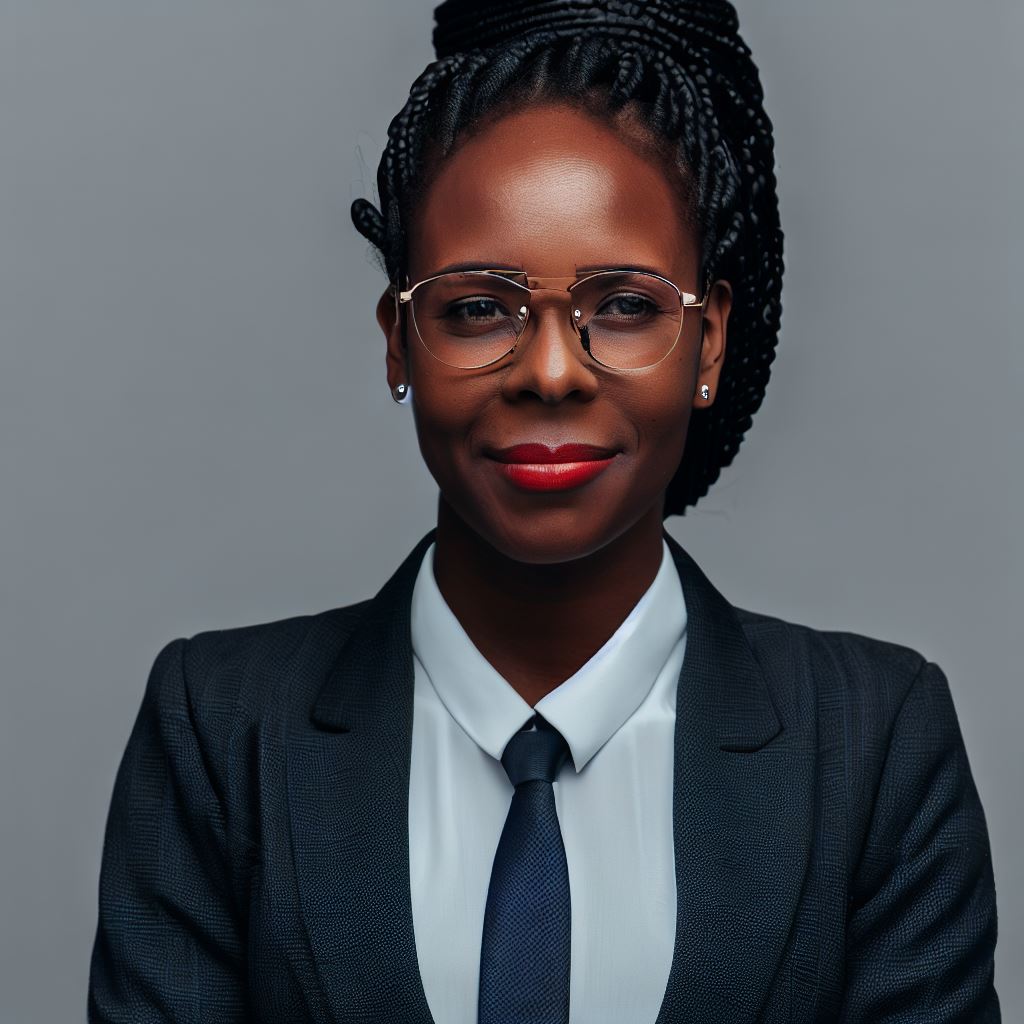Introduction
A. Women in Logistics in Nigeria
Women in Nigeria are breaking barriers in logistics, a traditionally male-dominated field, making significant contributions to the industry.
B. Purpose of the Blog Post
This blog post aims to shed light on the remarkable achievements and challenges faced by female logisticians in Nigeria, inspiring more women to pursue careers in this dynamic sector.
Overview of Logistics in Nigeria
The logistics industry in Nigeria has thrived, playing a crucial role in bolstering the country’s economy.
Nigeria’s population exceeding 200 million fuels demand for efficient supply chain management, driving opportunities across industries.
A. Brief background of the logistics industry in Nigeria
- The logistics industry in Nigeria has evolved over the years, adapting to meet the increasing demands of a growing economy.
- Initially, logistics primarily focused on transportation, warehousing, and distribution. However, it has expanded to include inventory management, procurement, and customs clearance.
- The industry has seen the emergence of specialized logistics providers, as well as the integration of technology for enhanced efficiency.
- Key players in the Nigerian logistics industry include freight forwarding companies, shipping lines, customs agents, and transport companies.
- Logistics hubs and free trade zones have also been established, further boosting the industry’s growth.
B. Importance of logistics in Nigeria’s economy
- Logistics plays a crucial role in facilitating trade both domestically and internationally, contributing to Nigeria’s economic development.
- Efficient logistics operations cut transportation costs, reduce lead times, and lower product prices, thereby increasing consumer accessibility and affordability.
- Logistics infrastructure, including ports, airports, and road networks, empowers Nigerian businesses by facilitating seamless goods transportation.
- The logistics industry creates employment opportunities, particularly within transport and warehousing, contributing to poverty reduction and socio-economic empowerment.
- Logistics facilitates the timely delivery of raw materials and finished products, promoting growth and productivity in the agricultural and manufacturing sectors.
- A well-developed logistics system ensuring smooth goods movement attracts foreign direct investment to Nigeria.
The logistics industry in Nigeria has made substantial progress and is pivotal to the country’s economic growth.
The logistics sector, as Nigeria emerges, will increasingly meet consumer and business demands, playing a pivotal role.
Read: Sustainability in Logistics: Practices in Nigeria’s Industry
Gender Disparity in the Logistics Industry
Women are significantly underrepresented in this field, and this section aims to shed light on this issue and present statistics showcasing the gender gap specifically in Nigeria.
- Lack of representation: The logistics industry has traditionally been male-dominated, resulting in limited opportunities for women to pursue careers in this field.
- Stereotypes and biases: Gender stereotypes and biases hinder women’s presence in logistics due to its perceived physical demands and traditional masculine traits.
- Limited career choices: Many girls are not encouraged to consider logistics as a career option due to prevailing stereotypes and lack of exposure to this industry.
- Data and statistics: According to a report by the Nigerian Logistics & Supply Chain Association, only 20% of the workforce in logistics in Nigeria consists of women.
- Gender pay gap: Data also reveals that women in logistics earn less than their male counterparts, indicating a significant wage disparity.
- Leadership positions: Limited career progression and implicit biases contribute to the shortage of women in leadership roles within logistics firms.
- Cultural and societal norms: Social expectations, cultural norms, and family responsibilities often hinder women from pursuing careers in logistics, resulting in their underrepresentation.
- Benefits of gender diversity: Studies confirm gender diversity enhances decisions, innovation, and financial performance. Logistics should tap into women’s talent for benefits.
- Steps towards change: Encouraging women to enter logistics involves offering mentorship, education, and scholarships tailored to girls.
- Changing perceptions: To attract more women to logistics, we must challenge stereotypes and biases by actively promoting diverse roles and opportunities.
By acknowledging this gender gap, implementing proactive measures, and promoting inclusivity, the industry can harness the untapped potential of female logisticians, leading to a more diverse and prosperous future.
Read: Impact of Regulations on the Logistics Profession in Nigeria
Challenges Faced by Female Logisticians in Nigeria
Women in the logistics industry in Nigeria face a range of challenges and obstacles that can hinder their success and advancement.
In this section, we will identify the specific challenges and biases that women encounter in this field, and explore the societal and cultural factors that contribute to these challenges.
A. Lack of representation
- Women are underrepresented in top leadership positions in the logistics industry.
- There is a perception that logistics is a male-dominated field, leading to bias against women.
- Male-dominated work environments can create an uncomfortable and challenging atmosphere for women.
B. Gender stereotypes
- Traditional gender roles often reinforce the idea that logistics is a male profession.
- Women may face prejudice and skepticism regarding their abilities to handle physically demanding tasks.
- Gender stereotypes can limit the opportunities available to women in the logistics industry.
C. Work-life balance
- Women face unique challenges when balancing their professional and personal lives.
- Long working hours and unpredictable schedules can make it difficult for women to fulfill familial responsibilities.
- The lack of support systems and affordable childcare options adds to the challenge of maintaining work-life balance.
D. Limited access to training and education
- Women often have limited access to training and education opportunities in the logistics sector.
- Inadequate resources and biased cultural norms can restrict women’s ability to gain necessary skills and knowledge.
- This limited access to training and education hampers the career growth and development of female logisticians.
E. Workplace discrimination
- Women in logistics may experience gender-based discrimination, including unequal pay and limited job advancement.
- Discrimination can also manifest in the form of exclusion from decision-making processes and unequal treatment.
- Sexual harassment and a lack of policies to address it further contribute to the challenges faced by female logisticians.
F. Societal norms and cultural factors
- Traditional gender roles and expectations can discourage women from pursuing careers in logistics.
- Male-dominated societies may view women in logistics as breaking social norms, leading to resistance and bias.
- Cultural stigmas and biases can create additional barriers for women seeking leadership roles in the industry.
Overcoming these challenges and biases is crucial for the empowerment and advancement of women in the logistics industry in Nigeria.
Efforts should be made to increase representation, challenge gender stereotypes, and provide equal opportunities for training and education.
It is vital to establish supportive policies and inclusive work environments that address workplace discrimination and ensure work-life balance.
By addressing these challenges and promoting gender equality, the logistics industry in Nigeria can benefit from the diverse perspectives and talents of female logisticians.
Read: Starting a Logistics Firm in Nigeria: A How-to Guide

Success Stories of Female Logisticians in Nigeria
A. Achievements and contributions of notable female logisticians
Logistics is a male-dominated industry in many parts of the world, but in Nigeria, female logisticians have emerged as successful leaders, breaking barriers, and making significant contributions to the field.
Their achievements and inspiring stories are worth highlighting to motivate aspiring women in the industry. Here are some success stories of female logisticians in Nigeria:
1. Bola Adesola
Bola Adesola is a notable female logistician who has made remarkable contributions to the industry.
She served as the Managing Director and CEO of Standard Chartered Bank Nigeria and has also chaired the Lagos Chamber of Commerce and Industry.
Bola’s leadership skills and expertise have made her a trailblazer in the logistics field.
2. Funmi Roberts
Funmi Roberts has excelled in the logistics industry by founding a logistics company called “Logmate.”
Her company focuses on providing technological solutions to logistics challenges in Nigeria.
Funmi’s innovative approach has contributed to the growth and efficiency of the logistics sector in the country.
3. Rachel Okporu
Rachel Okporu is another inspiring female logistician in Nigeria.
She is the founder of “Logistic Arena,” a platform that connects logistics professionals and facilitates collaboration in the industry.
Rachel’s determination and entrepreneurial spirit have helped her overcome obstacles and become a prominent figure in the logistics field.
4. Chiamaka Ibe
Chiamaka Ibe is a young, trailblazing female logistician who co-founded “Wecyclers.”
Wecyclers is a waste management and recycling company that operates in Lagos, Nigeria.
Chiamaka’s innovative business model has generated job opportunities for numerous Nigerians and advanced sustainability in the logistics sector.
5. Yewande Kazeem
Yewande Kazeem is a leader in the logistics sector, focusing on cold chain management.
She founded “Wandel International Nigeria Limited,” which specializes in providing affordable refrigeration solutions to small-scale farmers and food retailers.
Yewande’s efforts have helped reduce post-harvest losses and ensure food safety in the country.
These women are just a few examples of the many female logisticians in Nigeria who have achieved remarkable success in their careers.
Despite the challenges faced in a traditionally male-dominated industry, they have shown resilience, grit, and determination to excel.
Their achievements and contributions have not only broken stereotypes but have also paved the way for more women to enter the logistics industry with confidence.
By sharing their inspiring stories, we hope to encourage more women to pursue careers in logistics and be part of its growth and development.
The success stories of these female logisticians highlight their ability to tackle complex logistical challenges, adapt to changing environments, and drive innovation.
They have proven that gender is not a limitation in the logistics field but rather a source of strength and diversity.
As more women pursue careers in logistics, there is a growing recognition of the value they bring to the industry.
Companies are now actively seeking to diversify their workforce by providing equal opportunities to both men and women, realizing that diversity leads to greater innovation and success.
The success stories of female logisticians in Nigeria serve as a testament to the immense potential and talent that women possess in the logistics industry.
By highlighting their achievements, we can inspire more women to break barriers, excel in their careers, and contribute to the growth and development of the logistics field in Nigeria.
Read: Logistics Certifications in Nigeria: A Comprehensive Guide
Efforts to Empower Women in Logistics in Nigeria
In recent years, there has been a growing recognition of the need to promote gender equality in various sectors, including logistics.
Nigeria, as a developing country, is making efforts to empower women in logistics and bridge the gender gap in this industry.
Several initiatives and organizations are actively working towards achieving this goal. Below are some examples of programs aimed at empowering women in the logistics sector in Nigeria:
A. Women in Logistics and Transport (WiLAT) Nigeria
WiLAT Nigeria is a professional organization that focuses on promoting gender equality and empowering women in the logistics and transport industry.
The organization aims to provide a platform for women to network, access mentorship opportunities, and enhance their skills in the field.
WiLAT Nigeria conducts capacity building training, seminars, and workshops specifically tailored to women in logistics.
B. Girls in Transportation Initiative
This initiative aims to spark interest in transportation and logistics careers among young girls in Nigeria.
It organizes programs, events, and competitions that expose girls to the logistics industry at an early age.
By doing so, it encourages them to consider career paths in logistics, breaking gender stereotypes and increasing female representation in the field.
C. Women Empowerment in Logistics and Transport (WELT)
WELT is an initiative that seeks to empower women in logistics and transport by providing them with relevant skills and knowledge.
The program offers training in key areas such as supply chain management, transportation planning, and inventory control.
By equipping women with these skills, WELT enhances their employability and enables them to take up leadership positions in the industry.
D. Women’s Logistics and Transport Forum (WLTF)
WLTF is a platform dedicated to promoting the participation and representation of women in the logistics sector.
It organizes conferences, symposiums, and forums that address key issues affecting women in logistics.
These events facilitate knowledge sharing, networking, and collaboration among female logisticians in Nigeria.
E. Gender-Responsive Policies and Practices
Efforts to empower women in logistics also involve implementing gender-responsive policies and practices within organizations.
Companies in Nigeria are encouraged to provide equal opportunities for women in terms of recruitment, promotion, and career development.
By implementing such policies, gender biases can be addressed, and women can thrive in the logistics industry.
Overall, various initiatives and organizations in Nigeria are working towards promoting gender equality in logistics.
Programs such as WiLAT Nigeria, Girls in Transportation Initiative, WELT, and WLTF are empowering women in the industry by providing training, networking, and support.
Moreover, gender-responsive policies within companies are crucial for creating an inclusive work environment.
These combined efforts are helping to bridge the gender gap and create more opportunities for women in logistics in Nigeria.
Benefits of having more women in logistics
Women play a crucial role in the logistics industry, and having more women in this field has several benefits.
Gender diversity brings positive impacts not only to the individuals involved but also to the industry and the economy as a whole.
Here are some significant benefits of having more women in logistics:
- Enhanced problem-solving skills: Women’s unique perspectives and approaches enhance logistics problem-solving by fostering innovation through diverse experiences and thinking styles.
- Improved communication and teamwork: Women excel in communication and teamwork, fostering a positive logistics environment, enhancing operations and customer satisfaction.
- Increased adaptability and flexibility: Women frequently exhibit remarkable adaptability and flexibility in logistics, aiding in smooth operations and efficient handling of unexpected challenges.
- Enhanced customer service: Women’s empathetic nature enhances logistics customer service, improving understanding and addressing needs for higher satisfaction and repeat business.
- Overcoming stereotypes and biases: Women’s increased presence in logistics shatters stereotypes and biases in this male-dominated field, fostering inclusivity and gender-neutral opportunities.
- Talent retention and attraction: An inclusive logistics environment attracts top talent by involving women in leadership and acknowledging their contributions.
- Enhanced collaboration and innovation: Gender diversity promotes collaboration and cultivates an inclusive culture, igniting innovation and creativity in logistics operations through diverse perspectives.
- Economical advantages: Gender diversity in logistics can bring economic benefits. Research indicates diverse teams outperform competitors and yield superior financial results.
- Increased profitability: Increased profitability in logistics results from diverse input, enhancing decision-making and fostering better outcomes, ultimately boosting financial success.
- Role model effect: More women in logistics serve as role models, inspiring young girls to consider careers, fostering future workforce balance and equal opportunities.
Embracing gender diversity is not just a matter of equality; it is a strategic advantage that can drive success and innovation in the logistics sector.
Conclusion
This post highlighted the experiences and challenges faced by women in the logistics industry in Nigeria.
It showcased their resilience, skills, and determination to succeed.
However, it also shed light on the existing gender imbalance and discrimination that hinder their progress.
The logistics sector in Nigeria urgently requires heightened gender diversity to address its current imbalance.
By providing equal opportunities, breaking down barriers, and promoting inclusivity, the industry can benefit from the unique perspectives and talents women bring.
Stressing gender equality empowers women and boosts logistics sector efficiency and success.
It is time for Nigeria to embrace the untapped potential of its female logisticians.




